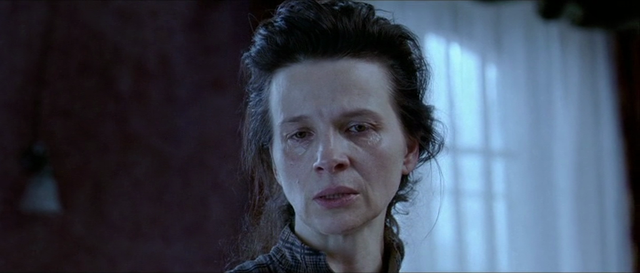By Armond White
The false politics of film culture 2013 (films exploiting race, class, sexual politics) paralleled the continued diminishment of cinephilia that has subordinated movies to TV, shifting cinema from a popular art form into political soccer games for media’s power elite. Lots of good film but also lots of not-so-hidden-agendas without depth, imagination or feeling. Values from the humanities persist yet struggle for attention over narcissism, nihilism, greed and retrograde esthetics. Only adventurous moviegoers saw the best films, everyone else saw hype. After a year of gross offenses and deep beauty, the Better-Than List knows the difference.
The We and the I> Short Term 12
Michel Gondry’s inventory of basic youth experience (a bildungsroman on wheels) cut through Destin Cretton’s patronizing, maudlin sociology. Gondry’s nearly miraculous feat, as good-natured as it was sensitive and inventive, may be the best film ever made about America by a non-American. A triumph of universality, plus the most profound, insightful, democratic title in years.
Zack Snyder’s powerful visionary re-imagining of the spiritual potential in comix trounces Alfonso Cuaron’s second-rate Kubrick-DePalma rip-off.
Pain & Gain > The Wolf of Wall Street
Michael Bay satirizes American ambition in imagery so bright and exhilarating it exposes the core of spiritual dislocation and rot that Scorsese turns into another self-pleased, overlong gangster epic.
Yossi > Blue is the Warmest Color
Eytan Fox updates Mann’s Death in Venice to L’chaim in Israel; his radiant view of gay humanity rejects Abdellatif Kechiche’s smutty girl-on-girl ode to lovelessness.
Caught in the Web> A Touch of Sin
Chen Kaige’s digital-era farce interwove love stories at cross-purposes with technology while Jia Zhangke smirkingly celebrated China’s moral decline.
The Grandmaster > The Great Gatsby
Wong Kar Wai investigates Chinese spiritual identity through an exquisite, romantic martial arts history but Baz Luhrmann’s latest mess got everything about sex, America, cinema (and F. Scott Fitzgerald) wrong.
Neil Jordan’s ultimate pop-genre revue chose life, unleashing the power of femininity upon its restrictions in British literary and social tradition while Spike Jones dehumanized femininity–and love–as a po-mo joke.
Bullet to the Head > Mud
Walter Hill’s dynamic comeback further analyzed masculinity but in fresh New Millennium context while Jeff Nichols fell further back with ersatz corn-pone juvenilia, the year’s sorriest American movie.
American Hustle > August: Osage Country, The Place Beyond the Pines
David O. Russell’s acting class throwdown shows America to itself as a 70s costume party more exuberant and perceptive than dysfunctional clichés from derivative Broadway product and uninspired Sundance-indie formula made only to collect prizes.
42 > 12 Years a Slave, Lee Daniels’ The Butler
Brian Helgeland interlaced two sides (Jackie Robinson and Branch Rickey) of America’s civil rights revolution, making the familiar intense, warm and radiant as Myth. Race-hustler Steve McQueen overplayed the guilt card and Lee Daniels mortgaged his pride in lieu of skill.
Our Nixon > Stories We Tell
Penny Lane’s remarkable act of documentary compassion (using home-movie proof that Watergate was the result of people as human as us) was deliberately misread as more character assassination while Sarah Polley egotistically exploited trite family history.
The Gardener > The Act of Killing
Moshen Makhamalbaf’s brilliant father-to-son survey of belief systems linked by Love contrasts Joshua Oppenheimer’s repugnant, fraudulent vaudeville about Indonesia’s death squads–smart-ass political porn.
You Ain’t Seen Nothin’ Yet > Computer Chess
Alain Resnais’ continually astonishing, estheticized exploration of memory and emotion hits a new theatrical-cinema-dream peak that embarrasses Andrew Bujalski’s intentional (yet unintentionally crude) denial of cinema as an esthetic pleasure.
New Slaves > Inside Llewyn Davis
Kanye West’s one-man cinema revival (music video as drive-in movie) was attached to musical/cultural innovation while the Coen Brothers’ Dylanology retreated into hoary yuppie nostalgia. Punk vs. The Establishment.
Bad Grandpa > Nebraska
Same premise, different result. Jackass auteur Jeff Tremaine’s road movie found common, if derisive humanity while Alexander Payne merely derided unsophisticated Middle Americans on his road to Hatersville.
 Camille Claudel 1915, Hannah Arendt, Byzantium, Mental, American Hustle > Blue Jasmine
Camille Claudel 1915, Hannah Arendt, Byzantium, Mental, American Hustle > Blue Jasmine
Binoche, Sukowa, Arterton, Adams, Lawrence, Collette gave a year of revelatory female performances through inspired auteurs, all ignored for Cate Blanchett’s dreadful, facetious embodiment of another foul Woody Allen conceit. The problem with contemporary film culture–in skirts.
Follow Armond White on Twitter at 3xchair


